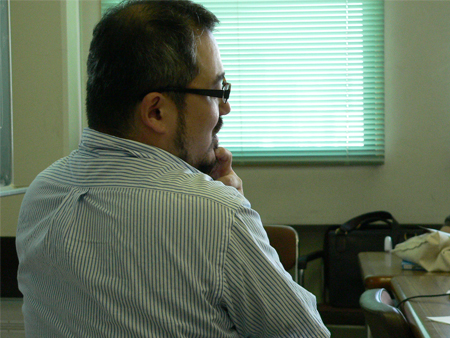UTCP Education Program "Brain Sciences and Ethics" Seminar 3, Session 11
New report on our activities: In Session 11 of the 3rd Seminar: "Reading Prinz's The Emotional Construction of Morals", we discussed the chapter 7: "The Limits of Evolutionary Ethics".
Reported by Ryoji SATO (Fellow, UTCP)
In session 11, we read from 7.2.3 and 7.3. In these sections, Prinz criticized evolutionary ethicists, emphasizing the importance of culture. According to him, our morality is not by nature, but by nurture.

In 7.3, Prinz argued that morality is a byproduct: we have no special module for morality. According to him, morality is like clothing. Clothing is useful, but we do not have a clothing module in our brain. Prinz insisted that morality emerged from capacities evolved for other purposes: emotion, rule-formation, long-term memory, imitation, and mind-reading. Combined all these capacities together, we come to have moral rules.
Prinz here stressed the importance of meta-emotion. We often feel guilty about not feeling guilty or we are angry at a person who does not feel anger over something bad. These meta-emotions motivate us to obey rules because we would feel bad when we did not obey the rules. Hence it plays an important role in moral education. Meta-emotion enables us to acquire new moral rules. Meta-emotion also brings meta-punishment, which is the punishment on those who do not punish offenders. To express disappointment at those who do not punish first-order offenders makes them feel bad at not feeling bad. Thus, those people get a tendency to punish first-order offenders. In this way, meta-cognitive capacities are indispensable for our morality. Moral rules are affect-back rules, whose contents are acquired. Hence there is a large room for enculturation. Through it, we can strengthen our natural norms or diminish them.
Prinz discussed his picture of moralization in moral domains, such as kindness, fairness, reciprocity, social ranks, and sex, examining anthropological data in detail. According to him, all of moral rules are not hard-wired but culturally set up. Although Prinz dealt with many instances, I mention only one of them here. I will take up infidelity. Evolutionary psychologists maintain a man innately cares about sexual infidelity of his partner, but a woman innately cares about emotional infidelity of her partner, because these tendencies are good for genes. But Prinz denied this argument, pointing out cultural variations. In the Netherlands, men and women answer in a very similar way. They both regard emotional infidelity as worse than sexual one. Prinz does not deny that we have an evolved tendency to punish infidelity, but he said moral rules against infidelity are influenced by culture and hence diverging. Moral norms can override our natural norms.
In this chapter, Prinz dealt with the status of morality in the evolutionary context. Although it is based on many evolved capacities, we have no moral module. I think Prinz must be right here. Our morality is not innate and changes its content according to cultural contexts. If our morality were innate, our mothers would not have needed to slap our buttocks. Evolutionary ethicists’ arguments sound too hasty to me. Finding evolutionary merits of a behavior is not enough to claim for an innate module for the behavior. We have to look for better explanations carefully. Next week, we will read the final chapter: Moral Progress. Prinz will show how moral progress is possible in his relativist theory.

Download PDF (35KB)






